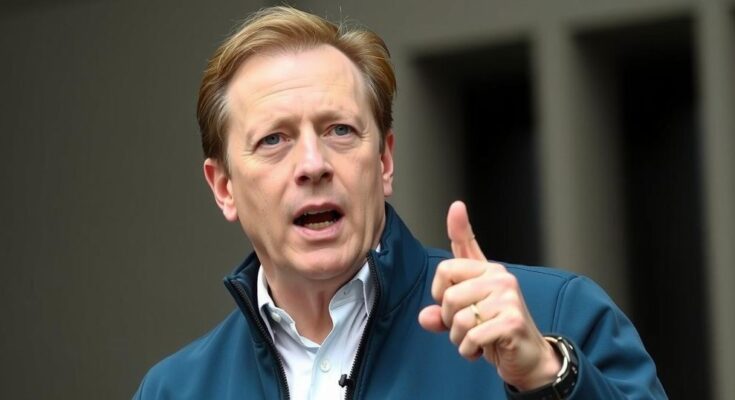Elon Musk has publicly supported Germany’s AfD party, claiming it is vital for the country’s future amid economic challenges. His op-ed sparked outrage among German politicians and media, raising concerns about foreign influence in elections. Critics accuse Musk of promoting extremist views, while Musk defends the AfD’s positions and points to misconceptions about the party’s leadership.
In a recent op-ed published in the Welt am Sonntag, billionaire entrepreneur Elon Musk reiterated his support for Germany’s far-right political party, the Alternative for Germany (AfD). He declared that “only the AfD can save Germany,” arguing that the party offers hope amid perceived economic and cultural decline. Musk characterized the AfD as a solution to Germany’s struggles with immigration policies and described its leadership as falsely labeled as extremist. His promotion of the AfD has generated backlash among German officials and media, leading to protests within the editorial staff of Welt and accusations of meddling in German politics.
The publication of Musk’s article, sanctioned by Welt’s editor-in-chief, Jan Philipp Burgard, sparked significant controversy. Friedrich Merz, a candidate for chancellor, condemned the op-ed as an unwelcome influence, while Lars Klingbeil of the Social Democrats equated Musk’s actions with those of Vladimir Putin regarding election interference. Hailing the AfD’s regulatory and tax policies, Musk defended the party, suggesting that misconceptions about its stance stem from biases against its leadership, specifically noting Alice Weidel’s same-sex partnership. This unusual support from Musk, who has a reputation for global political influence, raises concerns regarding the normalization of far-right ideologies in Germany.
The interplay between media freedom and political endorsements in Germany is complex, as freedom of expression is constitutionally protected. Past instances of media endorsements, however, remain rare. Questions surrounding the motivations for Musk’s article and its publication remain, especially concerning the influence of the Springer media group and its CEO, Mathias Döpfner. Musk’s perspective appears to align with his economic interests, particularly regarding his Tesla operations in Germany. His advocacy for lower taxes and deregulated markets aligns with the AfD’s platform, potentially serving his business agenda while amplifying the party’s visibility in the political arena.
The involvement of foreign figures in domestic politics, particularly in democracies like Germany, has become a contentious topic. Elon Musk’s recent endorsement of the AfD signifies a broader trend of right-wing populism gaining traction in various nations. The AfD’s growing popularity, reaching approximately 20% in recent polls, has prompted significant attention and controversy. The media landscape in Germany, characterized by its commitment to objectivity and impartiality, faces challenges when navigating commentary that may influence public sentiment or electoral outcomes. Musk’s prominence and influence extend beyond business, raising concerns about the implications of his political statements on the German electoral system.
Elon Musk’s recent endorsement of the far-right AfD in Germany has ignited considerable controversy and raised critical questions about external influences on national politics. His rhetoric highlights the challenges associated with the portrayal of political entities and the implications of media endorsements in a democratic society. While Musk’s economic motivations may drive his support, the backlash from political leaders and media emphasizes the discomfort with populist movements that threaten the established democratic order in Germany. This incident serves as a reminder of the importance of safeguarding the integrity of political discourse amid rising tensions surrounding populism and foreign intervention.
Original Source: www.dw.com




